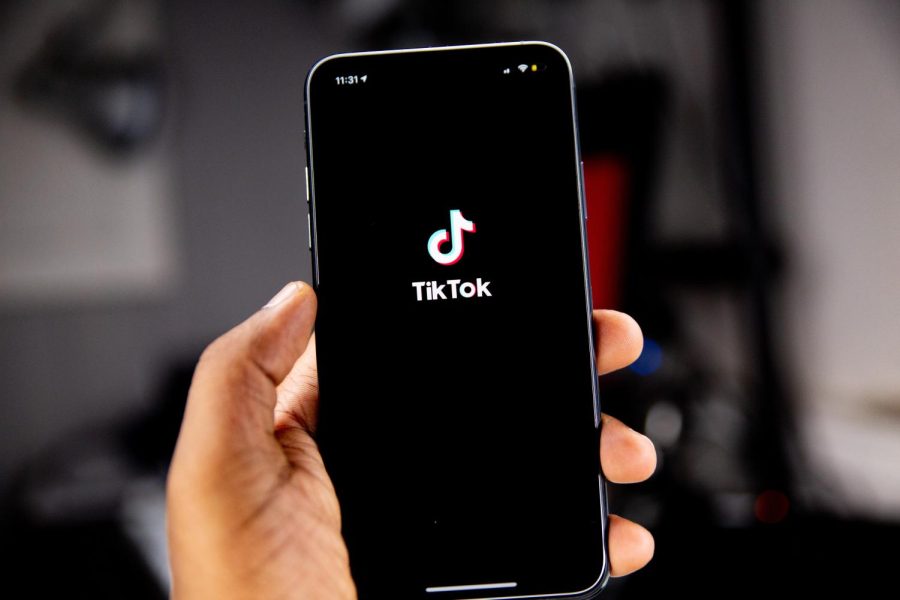Say goodbye to your FYP: Is TikTok being banned?
`UNSPLASH PHOTO COURTESY OF Solen Feyissa
America reacts to the threat of banning TikTok. https://unsplash.com/license
March 31, 2023
TikTok caught the public’s eye in 2016 and has grown to over 1.5 billion active users in the years following. However, with suspicions over misuse of user data and invasive practices, President Biden banned access to the platform on all federally-issued devices in a bipartisan spending bill in December 2022.
Despite the app’s popularity, the government has been trying to limit its reach for years. As found by Business Insider, the military banned it on all of its devices in 2019. The following summer, former President Trump threatened to wipe the app from the country’s phones if ByteDance didn’t sell its platform to an American company.
Almost three years later, the government took action again. While this ban might not affect the general public, it has an impact; as reported by NBC, almost four million employees no longer have access to the app, except for “law enforcement activities, national security interests and activities, and security researchers,” according to the bill.
Many have been wary of TikTok’s use of data for years. As stated on its official support page, the app will collect an “approximate location” based on device information such as SIM cards and IP addresses. While the page claims to use this to recommend content popular in users’ areas, an investigation from BuzzFeed News revealed that American TikTok employees had almost no access to this information and often were forced to submit it to their Chinese counterparts.
Freshman Sophie Fillapelli of Little Silver is aware of TikTok’s controversial guidelines, but believes other apps are at fault as well.
“I do think it’s a breach of privacy, but I think many other apps do the same thing,” Fillapelli said. “If TikTok is going to get banned it’s only fair that all of those other apps that do the same thing should be too. If people are like ‘TikTok’s tracking me,’ sweetheart, your whole phone is.”
Investigations from numerous news outlets reinforce suspicions over TikTok’s practices. In 2019, The Guardian uncovered guidelines that instructed moderators to suppress information on Hong Kong Protests, the Tiananmen Square Massacre and other events that damaged the Chinese government’s reputation. Similarly, when journalists at Forbes investigated the site, it was discovered that employees at TikTok’s parent company ByteDance improperly obtained their IP addresses and attempted to track the writers.
“This is a direct assault on the idea of a free press and its critical role in a functioning democracy,” said Forbes’ Chief Content Officer Randall Lane. “This raises fundamental questions about what they are doing with the information they compile from TikTok users.”
This suppression has sparked similar initiatives across the country, as 32 states have banned the app on government devices, according to CNN Business. In Texas, a directive from Governor Greg Abbott stole access to the app on a major college’s public wifi.
Some bans cover state schools such as the University of Oklahoma, Alabama’s Auburn University and the University of Houston system, where students using school wifi can’t access TikTok anymore.
With the ban having such a far reach, the possibility of TikTok’s permanent suppression is becoming a reality. The platform still has a home in the phones of millions of Americans, but voices in government are calling for change.
Congressman Raja Krishnamoorthi joined Senator Marco Rubio and Representative Mike Gallagher to sponsor the ANTI-SOCIAL CCP Act, which would aim to suppress the platform across the United States.
“I’m very concerned about this issue,” Krishnamoorthi stated in a Forbes interview. “ByteDance’s Editor in Chief is the secretary of its internal Chinese Communist Party committee, and he stressed that ByteDance’s products must have, quote, ‘correct political direction.’ So what the heck does that mean?”
There isn’t a current threat to the general public’s access, but TikTok proves itself as a harmful platform. With its suspicious behavior in the spotlight and bans throughout the country, American audiences could lose access to the app.
Sophomore Charlotte Davis of Howell Township believes that while the current suppression doesn’t have much effect now, TikTok could be more limited in the future.
“I think it probably will get banned based on everything I’ve seen,” Davis said. “If you have sensitive information on your device you should take all the steps you can to avoid any security issues.”
Despite recent events, some believe that the government won’t go through with the ban, partly because it was never finalized in 2020 and because it hasn’t caused a tangible effect on national security.
Junior Alex Batzar of Middletown believes TikTok has a place to stay.
“I don’t think that TikTok will be banned in the future but I’m not 100% sure,” Batzar said. “I don’t really think that it poses a threat to national security, but if it was banned, I think it would be a good thing because I’m on TikTok too much.”





